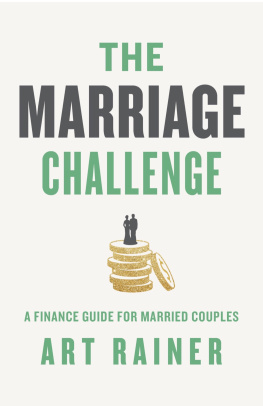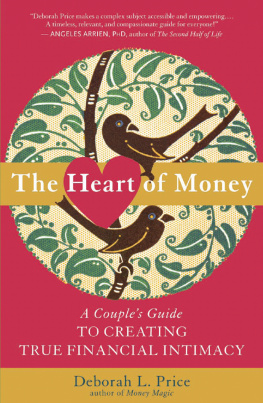Introduction
Staying on top of your finances when youre single can be tough enough. But add another person to the mix and it can seem downright daunting. Since the first Smart Cookies book came out, weve been approached time after time by people who are getting their own money situation under control but feel out of sync financially with their partners in life. Even if youve got your own finances in order, it is inevitable that some sort of money issue will come up when youre part of a coupleand not just because one of you may be in better shape financially, but because you probably each have very different perspectives on money and how to manage it.
Maybe youre trying to save more money but hes a big spender. Maybe she earns a lot more than you do, but you still want to feel like youre contributing and having a say in how you manage your money together. Or vice versa. Maybe youre just not sure about things like how to split the bills, whether to merge your accounts, or how much of what you should each be responsible for if you earn different incomes. Or you felt like you were doing just fine financiallythat is, until he lost his job, or you lost yours, and now you can no longer afford to buy that condo youve had your eyes on. Or youve found that youre suddenly struggling to cover the bills or plan for your future, and youre fighting all the time over money.
Couples and money is a hot topic! We wrote this book to address all of the nagging money questions and thorny situations that come up when youre in a relationshipwhether youre just starting to get serious or youre already married. We compiled all of the queries weve received about money and couples from across the country over the past yearthere have been tonsand in the following chapters we do our best to answer them. As with our first book, we think there is a lot to learn from firsthand experiences of financial woes and success stories, so we also interviewed several couples at different stages in their relationships. Youll read some of their stories, as well as ours, in the pages ahead.
If youre having trouble even bringing up the subject of money with your spouse, or the person youre dating, dont be discouraged. Youre not alone. Its tempting to avoid the topic, especially when youre in a new relationship. You probably dont need to see the studies (though they do exist) to know that money can be a source of frustration, conflict, and, yes, even breakups. You probably know that from personal experience. The five of us certainly do.
When we wrote our first book, The Smart Cookies Guide to Making More Dough, two of us had recently ended long-term relationships in which wed ceded almost total control of our finances to our partners, partly in an effort to avoid conflict (though in both cases it had the opposite effect). When the relationships ended, we were not only left in worse shape financially, but we lacked confidence and were at a loss as to how to manage our own money. We each learned a painful lesson: No matter who takes the lead in managing a couples money, both parties need to participate in the process.
We all have not-so-fond memories of issues that arose with past boy-friends over money; whether it was because of different spending styles, different expectations about who was responsible for what (even when it came to getting the cheque at dinner!), or different approaches to the way we made and managed our money. Looking back, it seems like the common thread was a lack of communication: We either ignored the problem or kept our concerns to ourselves until emotions hit the boiling point. By then we were so upset, it was tough to talk about money without it turning into a fight.
What weve learned is that by not talking about it early on, we really made things worse. Couples dont usually break up because they argue about money, they break up because they wait too long to talk about it. They avoid the subject until they reach the point where the consequences from their differences overshadow everything else, and it feels like its too late to change. That doesnt mean that you cant stay together if you dont share exactly the same perspectives on money, but you need to be able to find some common ground. Thats one reason why its so important to talk about money before you even move in with someoneand especially before you get married. You need to make sure that youre compatible not just physically and emotionally, but financially, as well. Too often, we act as if that piece will just fall right into place. If we get along well, we think, well have no problem merging our money and managing it together, right?
Wrong. The truth is you may have wildly different expectations about how much money you want to have and how you want to use it. Sure, you can still find a compromise that works for each of you, but that will only happen if you have an honest conversation about your financial expectationsabout the life that you want to have together, how youre going to pay for it, and whos responsible for whatbefore you walk down the aisle or co-sign a lease on an apartment together.
And yet very few couples do. Most put off that conversation until theyre forced to have it. Maybe not until one of you loses a job. Or until the lease on your apartment is up and you see it as an opportunity to buy a place together, but your partner has hardly anything saved up (and no idea that youd hoped to buy a home this quickly). Or until youre married and you get pregnant and then you both suddenly have to figure out how youre going to cover all the additional day-to-day expenses of having a babyespecially child care. Maybe you also need to get a bigger place to accommodate a child. Not the ideal time to discover that youre not on the same page financially. By then its too late. One of you will be resentful, the other one will feel guilty, confused, or even angry. And any discussion is likely to end in an epic argument.










